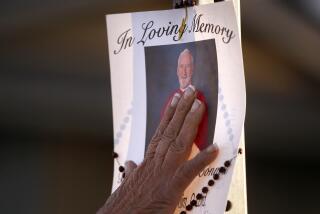Walter Righter dies at 87; controversial Episcopal bishop
- Share via
Walter C. Righter, a retired Episcopal bishop of Iowa who was absolved of heresy charges after ordaining a non-celibate gay man as a deacon in 1990, died Sunday at his home outside Pittsburgh after a long illness. He was 87.
His death was confirmed by Rich Creehan, a spokesman for the Episcopal Diocese of Pittsburgh, where Righter was ordained 60 years ago.
Righter became a lightning rod for dissent over the ordination of gays in the Episcopal Church when he was an assistant bishop in Newark, N.J., under Bishop John Spong, an outspoken supporter of ordaining lesbians and gays.
In 1990, with Spong’s approval, Righter ordained Barry Stopfel, whom he knew to be gay, as a deacon, a rank below that of priest. The next year Spong ordained Stopfel as a priest.
Church conservatives focused their outrage on Righter but did not file formal charges against him until 1995, when a five-year statute of limitations was set to expire. He was tried in 1996 by a panel of eight bishops, who, in voting 7 to 1 to dismiss the heresy charges, ruled that there was no church doctrine forbidding the ordination of gays and lesbians who are in a committed relationship.
In 1997, the church’s triennial General Convention issued an unusual apology to lesbians and gay men for “years of rejection and maltreatment by the church.” Although the church continues to struggle with issues involving the full inclusion of homosexuals, it ordained its first openly gay bishop — New Hampshire Bishop Gene Robinson — in 2003.
In a statement Monday on Righter’s death, Presiding Bishop Katharine Jefferts Schori said: “The Episcopal Church can give thanks for the life of a faithful and prophetic servant.... His ministry will be remembered for his pastoral heart and his steadfast willingness to help the church move beyond old prejudices into new possibilities.”
Righter was born in Philadelphia on Oct. 23, 1923. After studying at Yale’s Berkeley Divinity School, he was ordained in 1951 and served in churches in Pittsburgh and New Hampshire before being elected bishop in the Diocese of Iowa in 1972.
Soon after his consecration, he cast the deciding vote at a diocesan convention on a resolution supporting the ordination of women to the priesthood. “The laity clapped and cheered,” he wrote in a 1998 memoir, “A Pilgrim’s Way,” but 15% of the clergy left the diocese in protest. The entire Episcopal Church approved the elevation of women to the priesthood in 1976.
After 16 years as Iowa’s bishop, Righter retired in 1988. The next year he became a part-time assistant bishop to Spong, who was widely considered the church’s most liberal bishop.
Righter wrote in his memoir that in ordaining a gay deacon he was not trying to make a revolutionary statement. “I was, instead, agreeing to ordain a person who had met all the tests every other person is expected to meet before ordination. In a sense, it was more than time for this ordination to occur, honestly and publicly.”
Although other maverick bishops had knowingly ordained gays, church conservatives piled on Righter. The formal charges, called a presentment, accused him of heresy for signing a statement saying he supported the ordination of non-celibate homosexuals. The presentment also said Righter had violated his ordination vows by making Stopfel a deacon.
Although Righter said he was incensed by the charges, he maintained a sense of humor. At the trial he introduced himself as “Walter Righter, the heretic.” His wife, Nancy, wore a tag that said “heretic’s wife.”
In his 2000 memoir, “Here I Stand,” Spong speculated that church conservatives singled out the married, grandfatherly Righter because they viewed him as an easy target, “but they were dead wrong. He was made of steel and became stronger the more he was abused.”
In addition to his wife, Righter is survived a brother, four children and four grandchildren.
More to Read
Start your day right
Sign up for Essential California for the L.A. Times biggest news, features and recommendations in your inbox six days a week.
You may occasionally receive promotional content from the Los Angeles Times.





















































